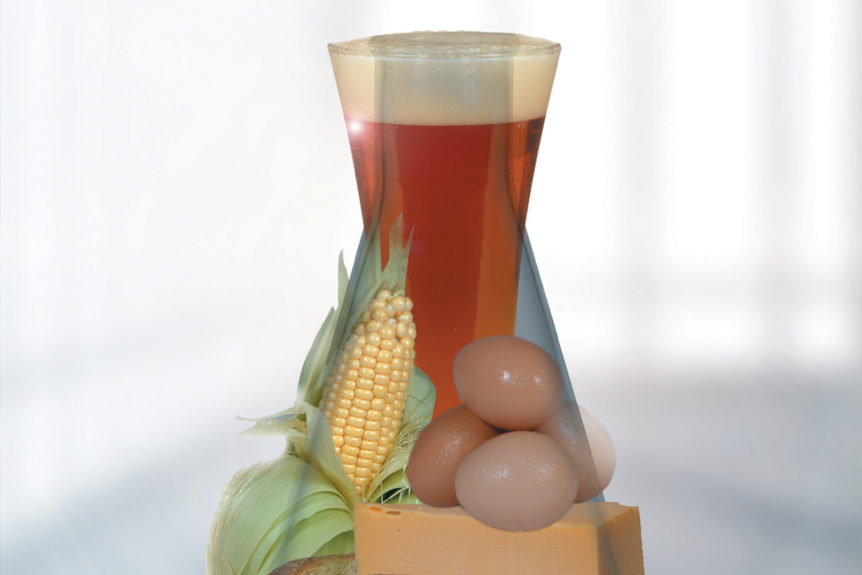Enzyme Development Corporation (EDC) has been producing specialty food enzymes since 1953. With a headquarters in New York City and a manufacturing facility located in Scranton, Pennsylvania, EDC is the only producer of papain in the western hemisphere.
When EDC began operating, its production facility was located in New Jersey, but as it grew, it chose to relocate to its current facility in Scranton in the 1990s to expand and improve its production and laboratory capabilities. The Scranton facility houses EDC’s manufacturing, quality control, regulatory, and warehouse. During its long history with the development of enzymes in the USA, EDC’s enzymes have been integral in improving the manufacturing of beer (chill haze reduction), maltodextrin, lactose-free milk, and pet food palatant products. In addition to those applications, EDC’s biocatalyst food enzymes are also used in markets such as baking, pet food, starch processing, spirits industry, cheese products, the beer industry, yeast processing, flavor manufacturing, lactose-free milk, digestive aids, supplements, plant meat substitutes, and many other novel, unique enzyme applications.
The manufacturing of biocatalyst enzymes is a process that requires intricate knowledge about how enzymes work and strong quality assurance capabilities. EDC’s Scranton manufacturing and quality teams have over 100 years of enzyme experience in manufacturing, quality, and application expertise. Recent specialty enzyme innovations at EDC include organic compliant certified enzymes, vegan compliant enzymes, and specialized flavor releasing biocatalysts.
Enzyme Development manufactures food enzymes from plant and microbial source origins. Each biocatalyst enzyme has a different enzyme biosystem manufacturing process. Plant enzymes are naturally occurring and extracted from fruits, flowers, trees, and other plants. For example, papain is extracted from the papaya (Carica species) fruit latex obtained from small farmers in Africa and Asia. Bromelain is extracted from the stems of Bromeliaceae familypineapple plants. Ficin is extracted from fig trees (Ficus species) from tropical regions. And, EDC’s biocatalyst enzyme Thistlezyme® protease enzyme is extracted from the flower of the Cynara cardunculus from Portugal. Microbial biocatalyst enzymes are manufactured through a fermentation process. The EDC enzyme fermentation biocatalysts processes include both traditional solid-state and liquid state submerged (deep tank) fermentations. Examples of production organisms utilized in solid-state fermentations are Aspergillus oryzae and Aspergillus niger. Bacillus amyloliquefaciens (B. subtilis) and Trichoderma longibrachiatum (T. reseei) are utilized in liquid state fermentations.
The quality of EDC’s enzymes are measured by the biocatalyst activity rate on standard and application model substrates. EDC’s diverse bioanalytical enzyme assay expertise laboratories in the USA running over 60 specialized enzyme assays. Microbial, pathogen, metals, and other specialty enzyme assays and quality testing are also critical in the quality control process. Quality staff receive regular training in specialized enzyme testing, microbial testing and maintain regulatory requirements.
EDC’s well-recognized Customer Service, based out of its New York City headquarters, coordinates logistics with customers throughout America, Canada, Latin America, Europe, and Asia. EDC’s customer service is known for its quick response times and providing a high level of service to its customers. Enzyme shipments, ranging from a single drum to a dedicated container truckload, are arranged for by EDC’s customer service team from Scranton to customers’ manufacturing plants.
EDC’s technical sales team is more than happy to assist you in identifying the enzyme that best suits your application goals and needs. EDC’s technical sales team has over 90 years of experience in the food and enzyme industries. All of the technical reps have scientific backgrounds ranging from chemistry, biology, food science, and engineering. Please contact us to speak with one of our technical representatives to find out how enzymes can create new opportunities for your business.
For further information on flavor modification or to discuss technical questions on the use of other enzymes, please contact Enzyme Development Corporation at:
info@EnzymeDevelopment.com
Josh@EnzymeDevelopment.com
© Enzyme Development Corporation, July 2021

